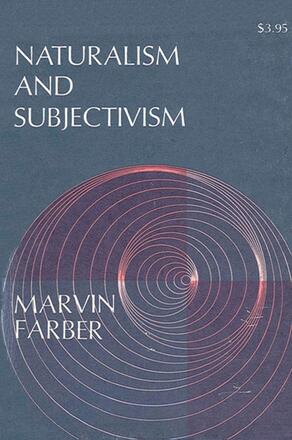Preface
I Experience and Basic Fact
A. The Issue of Naturalism vs. Subjectivism
B. The Historical and Social Character of the Analysis of Experience
C. Philosophic "Immediacy" and the Point of Departure for Philosophy
D. The Mind as Contributive and the Error of Irrationalism
E. The "Given" Element in Experience According to Lewis
F. Dewey on Immediate Knowledge and the Nature of the "Given"
G. The Principle of the Cooperation of Methods
II Naturalistic and Pure Reflection
A. On Subjectivism and the Meaning of Reflection
B. The Function and Aims of Reflection
C. Types of Reflection
D. Conditions Bearing on Reflection
E. The Ideal of Certainty
F. The Subjective Procedure of Phenomenology
III Beyond Naturalism
A. Fact and Essence
B. The Question of Naturalistic Misinterpretations
1. The Philosophical Epoché and the Danger of Hostility to Ideas
2. Concerning the Narrowness of the Historical Types of Empiricism
3. Empiricism as Skepticism
4. Obscurity on the Idealistic Side
5. Essence and Concept
6. The Principle of all Principles
7. On Positivism and the Use of Mathematics in Natural Science
8. Sciences with the "Dogmatic" and Sciences with the "Philosophic" Point of View
C. The Thesis of the Natural Point of View and its Suspension
1. The World of the Natural Point of View and the Ideal Worlds About Me
2. The "Radical Alteration" of the Natural Point of View
3. The Phenomenological Epoché
D. Consciousness and Natural Reality
1. Concerning "Pure" or "Transcendental" Consciousness as the Phenomenological Residuum
2. "Objectification" and Transcendence
3. The Immanent Nature of Perception and its Transcendent Object
4. Being as Consciousness and Being as Reality
5. ''Phenomenal" Being of the Transcendent, and "Absolute" Being of the Immanent
6. Indubitability of Immanent Perception, Dubitability of Transcendent Perception
IV Pure Consciousness
A. The Region of Pure Consciousness
1. The Natural World as the Correlate of Consciousness
2. The Logical Possibility and Real Absurdity of a World Outside Our Own
3. Absolute Consciousness as the Residuum after the Nullification of the World
4. The Phenomenological Point of View and Pure Consciousness as the Field of Phenomenology
5. The Significance of the Transcendental Preliminary Reflections
6. The Physical Thing and the "Unknown Cause of Appearances"
7. Animalia and Psychological Consciousness
8. Transcendent Psychological Experience Distinguished from Transcendental Experience
9. All Reality as Existing through "Meaning Bestowal": No "Subjective Idealism"
B. The Phenomenological Reductions
1. The Question Concerning the Extension of the Phenomenological Reduction
2. The Question of the Suspension of the Pure Ego
3. The Transcendence of God Suspended
4. The Suspension of Pure Logic and the Material-Eidetic Disciplines
5. The "Dogmatic" and Phenomenological Points of View
C. Preliminary Considerations of Method
1. The Importance for Phenomenology of Considerations of Method
2. The Self-Suspension of the Phenomenologist
3. Concerning Clearness and Clarification
4. Clearness, Free Phantasy, and Fiction
5. Concerning "Mathematical" Sciences of Essential Being
D. General Structures of Pure Consciousness
1. The Realm of Transcendental Consciousness
2. Reflection upon Experience
3. Phenomenology and the Difficulties of "Self-Observation"
4. The Relation of Experiences to the Pure Ego
5. Phenomenological Time and Time-Consciousness
6. Apprehension of the Unitary Stream of Experience as "Idea"
7. Intentionality as the Main Phenomenological Theme
8. Sensuous Hyle, Intentional Morphe
9. The Functional Problems
E. Noesis and Noema
1. Concerning the Study of Intentional Experience
2. Immanent and Intentional Factors of Experience; the Noema
3. Noematic Statements and Statements Concerning Reality
4. The "Noematic Meaning" and the Distinction between "Immanent" and "Real" Objects
5. "Doxic" (Belief) Modalities as Modifications
6. The Founded Noeses and Their Correlates
F. Reason and Reality
1. Object and Consciousness
2. Phenomenology of Reason
3. Pure Logic and Phenomenology
4. Regional Ontologies and Phenomenological Constitution
5. The Region "Thing" as a Transcendental Clue
6. Constitution in Other Regions
7. The Full Extension of the Transcendental Problem
V Phenomenology and Naturlaistic Philosophy
A. Antinaturalism in the Name of Rigorous Science
1. The Motive of Antinaturalism
2. Circumscribing Naturalistic Philosophy
3. Toward a Phenomenology of Consciousness
4. The Concept of a Phenomenon
B. Pure Psychology and Transcendental Reduction
C. The Idea of an Eidetic Anthropology
VI The Function of a Constitutive Phenomenology
A. The Ontological Priority of the Spiritual World
B. The Relations Between Psychology and Phenomenology
1. The Relationship of Phenomenology to the Sciences
2. The Ontological Foundation of the Empirical Sciences
3. Regional Concepts, Psychology, and Phenomenology
4. Phenomenological Description and the Domain of Experience
5. Ontological Description in Relation to Physics and Psychology
6. Rational Psychology Distinguished from Pure Phenomenology
C. The Relationship of Phenomenology and Ontology
1. The Question of the Inclusion of the Ontologies in Phenomenology
2. The Significance of Ontological Determinations for Phenomenology
3. Noema and Essence
4. Significance of the Ontological Concepts for Psychology
D. The Method of Clarification
1. On the Need for Clarification of the "Dogmatic" Sciences
2. Clarification of the Conceptual Material
3. Explication and Clarification
VII The Limits of Subjectivism
A. The Meaning of "Transcendence"
B. The "Riddle" of Transcendence
C. The Need for Complete Reflection
D. Doubt and Certainty
1. The Cartesian Procedure of Doubt and its Phenomenological Use
2. Husserl on Descartes
E. The Transcendental Dimension and the Treatment of History
F. Misplaced Subjectivism
VIII Max Scheler and the Spiritual Elevation of Man
A. Antinaturalism on all Fronts
B. Against Evolutionism, Humanism, and Human Ethics
IX The New Irrationalism
A. The Influence of Husserl's Subjectivism
B. Heidegger on Truth and Metaphysics
1. The Importance of Nothing
2. On the Essence of Truth
3. Heidegger on Husserl
4. Husserl on Heidegger: Existence and Philosophical Anthropology
C. Becker and Paratranscendence
D. Jaspers and the Evasion of Scientific Philosophy
E. Marcel and Mystery
F. Sartre and the Avoidance of Materialism
X Epilogue
A. Subjectivism on the Defensive
B. The Methodological Outcome
Index
